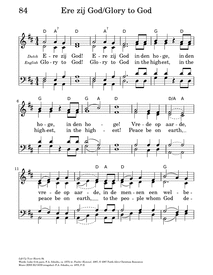The third "great" canticle in Luke's gospel (2:14) records the song the angels sang at the birth of Jesus. However, it is sometimes not counted as a canticle because it was expanded in later liturgical use into the Gloria, a longer text that began with this verse and became a regular part of the daily Mass (see PHH 247 for the complete Gloria text). The Latin incipit of this text, "Gloria in excelsis Deo," is often used independently as a chorus of praise, as in the refrain of 347 and other Christmas carols.
A certain F. A. Schultz prepared the text and music for "Ere zij God"; it was published in Bickers's and in the numerous editions of the popular Zangbundel compiled by Johannes De Heer in the first half of the twentieth century. Those collections provided a means for those who sang only psalms in church to sing many popular hymns at home. "Ere zij God" is the best-known Dutch carol in the Netherlands, and many Christian Reformed congregations with and without Dutch immigrants have made this song part of their Christmas celebration.
Jan Luth, current director of the Liturgical Institute at the University of Groningen in the Netherlands, suggests that the composer may have been Franz Albert Schultz (b. Neustettin, Germany, 1692; d. 1763), a German Lutheran theologian educated in Balle. In 1732 he became a professor of theology at Konigsberg in East Prussia, where he spearheaded reforms in the Prussian church and educational system according to an ideal of "active Christianity" Further research is needed to determine whether or not this carol was perhaps translated from German into Dutch.
Scripture References
st. = Luke 2: 14
The third "great" canticle in Luke's gospel (2:14) records the song the angels sang at the birth of Jesus. However, it is sometimes not counted as a canticle because it was expanded in later liturgical use into the Gloria, a longer text that began with this verse and became a regular part of the daily Mass (see PHH 247 for the complete Gloria text). The Latin incipit of this text, "Gloria in excelsis Deo," is often used independently as a chorus of praise, as in the refrain of 347 and other Christmas carols.
A certain F. A. Schultz prepared the text and music for "Ere zij God"; it was published in Bickers's and in the numerous editions of the popular Zangbundel compiled by Johannes De Heer in the first half of the twentieth century. Those collections provided a means for those who sang only psalms in church to sing many popular hymns at home. "Ere zij God" is the best-known Dutch carol in the Netherlands, and many Christian Reformed congregations with and without Dutch immigrants have made this song part of their Christmas celebration.
Jan Luth, current director of the Liturgical Institute at the University of Groningen in the Netherlands, suggests that the composer may have been Franz Albert Schultz (b. Neustettin, Germany, 1692; d. 1763), a German Lutheran theologian educated in Balle. In 1732 he became a professor of theology at Konigsberg in East Prussia, where he spearheaded reforms in the Prussian church and educational system according to an ideal of "active Christianity" Further research is needed to determine whether or not this carol was perhaps translated from German into Dutch.
The composite English versification prepared for the 1987 Psalter Hymnal follows the New International Version, which restricts God's favor to his chosen people. "Glory to God" is a fine hymn of praise to God, who brings peace to his people on earth through the birth of the Messiah.
Liturgical Use:
Christmas Day services and other occasions celebrating the significance of Christ's birth.
--Psalter Hymnal Handbook


 My Starred Hymns
My Starred Hymns


